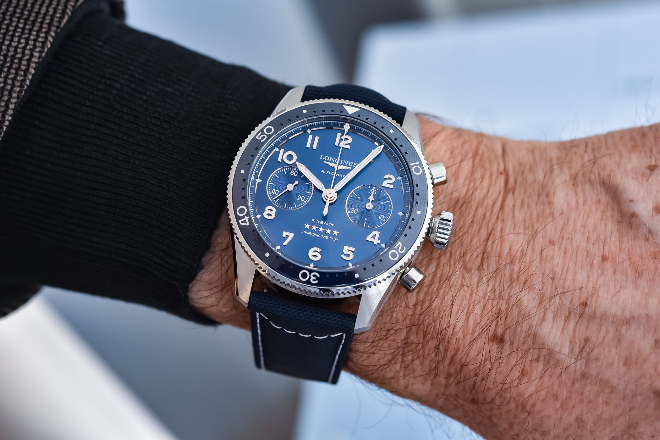As one of Switzerland’s oldest manufactures, it should come as no surprise that a great many horological complication was invented within the hallowed halls of Longines. One such complication is the flyback chronograph. Longines brought its first flyback chronograph watches to market all the way back in 1925. However, it was only a whole decade later, on 12 June 1935, that Longines filed a patent for the mechanism, which was then formally registered a year after, on 16 June 1936. The Longines Spirit Flyback pays tribute to all this history while taking flight into the future. When it was invented, the flyback chronograph mechanism is said to have been a great boon for those who needed to time quick successive intervals, such as pilots. Pilots benefitted greatly from being able to rapidly time different flight stages to aid in their navigation. While a chronograph is running, a timepiece equipped with a flyback mechanism is able to reset and restart counting from zero seconds, all using a single pusher. In the case of regular chronographs, the user has to stop the running chronograph, reset it and then press start again to restart.

In remembering the invention of the flyback chronograph and in honour of a particular pioneering American aviator and US Naval officer, Richard Byrd, Longines revealed the Spirit Flyback. Byrd set off on his expedition to Antarctica in 1928. Later, on 29 November 1929, along with his crew, Byrd attempted a flight over the South Pole. Byrd flew 1,290 kilometers, navigating with the help of a solar compass and Longines timepieces. At the conclusion of an arduous 19-hour flight, Byrd penned his name into the history books as the first person to fly over the South Pole. Byrd is said to have made three more trips to Antarctica. During the trip he took in 1939, Longines notes that he had worn a Longines 13ZN watch with flyback function for the expedition.

Inspired by this heritage, the Longines Spirit Flyback is first and foremost equipped with a new exclusive Longines calibre L791.4. The self-winding movement is COSC certified and fitted with an antimagnetic, silicon balance wheel. The 42mm watch features a bidirectional rotating bezel fitted with a ceramic insert. Impressively, the Arabic numerals and other makers on the ceramic bezel insert are coated with SuperLuminova. Offered in a blue and black variation, the dial of the watch, too, has SuperLuminova-treated applied Arabic numerals for the hours. For the chronograph functions, you have the central chronograph second hand as well as a 30-minute totalizer at 3 o’clock. The subdial at 9 o’clock accounts for the running seconds.
It is thanks to pioneers who were the first to purse the once unknown that we are able to call many aspects of present-day life commonplace. It is thanks to pioneering aviators the likes of Richard Byrd, that we are able to consider flying to all corners of the world an everyday affair. And it is thanks to pioneering horological minds, the likes of those at Longines in 1925 that we are able to list the flyback chronograph function as a standard complication readily available from multiple watchmakers today.
Movement: Automatic calibre L791.4 with chronograph; 68-hour power reserve
Case: 42mm in stainless steel; water-resistant to 100m
Strap: Leather, stainless steel bracelet or NATO fabric
Price: From USD 6,710
This article was first seen on WOW’s Summer #69 Issue.
For more on the latest in luxury watches, click here.